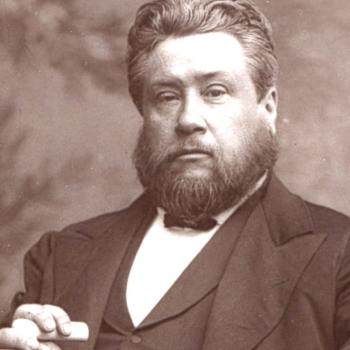I only mentioned Clinical Depression in passing when I preached the sermon this series is based on, due to time constraints. But I was careful to do so, and to stress that for some Christians antidepressant medications are helpful (see the previous post). One of the joys of a blog is that you don’t have such space issues. So here I will intersperse an extra post covering two important caveats to the teaching I have been sharing so far on joy.
Firstly, let me talk about temperament or personality. The simple fact is that some people seem to be born happy. They are ever the optimist. Often gregarious and outgoing, these people seem to love being the center of the party. Actually in many cases the smile is only skin deep, and Mr H.A.P.P.Y. is underneath as miserable as sin. God is not seeking the plastic pin-on smile some Christians feel they have to place on their faces before church either! Biblical joy is deep, and comes from a well inside. Some of these overly happy people need to take a chill pill and learn to mourn with those who mourn!
In fact, all Christians are meant to grow in joy. Thus, someone who by nature has a tendency to be cautious, cynical, and a pessimist may not find happiness all that easy. However, God can and does give such a person access to a joy that can help them overcome their natural personality just as much as the optimist.
In addition to our natural personality, there clearly is something called “clinical depression.” This is essentially periods of low mood that come on people for no real apparent reason, and are unshakeable by any of the usual means we employ to lift our spirits. And as much as the psalmist in Psalm 16 seems to be erupting with joy, at other points in other psalms he describes what can easily be seen as symptoms of what modern psychiatrists call clinical depression (see Psalm 31 and 102.) It should therefore come as no surprise to learn that many modern Christians suffer from depression. Indeed many greatly respected preachers have also suffered with bouts of very low mood, including C.H. Spurgeon. Nothing I am saying in this series is intended to minimize this problem, or imply that it can be simply waved away by means of being told to: “pull yourself together” One key symptom that is often present in clinical depression is precisely the inability for people to improve their moods by normal methods, i.e. things that usually make them happy no longer do.

It is not my place here to diagnose depression, though in previous years I worked as a psychiatrist. What I will say is that if you or someone you are trying to help is suffering from any of the following symptoms, speaking with a doctor or psychiatrist may be advisable. Note that you do not have to have all of these symptoms to have depression (see DSMIV criteria on which this is based):
- A clear and persistent change in a persons normal mood that is unexplainable and is not responsive to changes around the person. This may actually feel more like an emptiness of mood or an inability to feel.
- A lack of interest in, or perceived ability to perform, normal daily activities such that doing things becomes an effort.
- A change in appetite (increased or decreased) leading to a change in weight (up or down) that is not explained by dieting efforts.
- A significant increase or decrease in the amount of sleep taken. In particular waking up too early in the morning, feeling very tired. In contrast, a vastly reduced amount of sleep (or no sleep at all) without feeling tired the next day is a particularly concerning sign often associated with Bipolar Disorder)
- A restlessness and excessive energy, or a significant reduction in energy leading to “slugishness“, often associated with fatigue.
- Feelings of guilt or worthlessness which have no basis in fact, and which do not resolve when forgiveness is sought.
- An inability to think clearly, concentrate, or make decisions
- Thoughts of death, wishing to be dead, or the urge to commit self-harm or suicide
Much damage can be done by well meaning Christians who fail to recognize such signs in themselves or others and hence the help available is not received.
A few points about the causes of clinical depression. Psychiatrists are taught that depression is not actually a simple illness with a clear cause. We are told that depression has a biopsychosocial cause. Thus, especially when moderate or severe it is fair to say that there are receptor inbalances and other brain changes associated with feeling depressed. But, these changes are in part prompted by both social and psychological causes. Thus, stressful life events including bereavement, unemployment, physical sickness, relationship breakdown can all trigger depression. In addition depression is both caused by, and maintained by, in many cases negative patterns of thinking. For a Christian, we could clearly add “spiritual” to this wholistic view of man, and the Puritans spoke of the “dark night of the soul” where God withdraws his felt presence, and the Christian suffers with feeling abandoned and low, but must hold onto God in the midst of this. Many Puritan descriptions of conversion begin with the enquirer suffering under a weight of sorry caused by guilt over sin.
When it comes to treatment, the general view is that mild to moderate depression can often be successfully treated by various forms of counseling that aim to change negative thought patterns, and in some ways remind me of the Bible’s talk of us being transformed by the renewing of our mind. (See also an old series I wrote on Christian counseling). Some studies suggest that such treatments may be as successful in these cases as medication. Clearly, the more severe depression is the more necessary treatment with antidepressants become. But even in these cases one should never rely solely on antidepressants but look at other possible treatments. Addressing challenges in a person’s social or spiritual life can also help lift their mood.
Thus, a Christian should not feel guilty for being clinically depressed. But, God still has something to say to us in the midst of such trouble, and as we will see more tomorrow it is possible, even in the midst of sorrow to know joy. It might sound odd but you can be depressed and joyful at the same time. The Christians task when depressed is not to pretend they are happy, but to choose to rejoice in God, which largely means reaching out to him for joy, putting our faith in him, and choosing to be glad that he is our God and we are his children.













